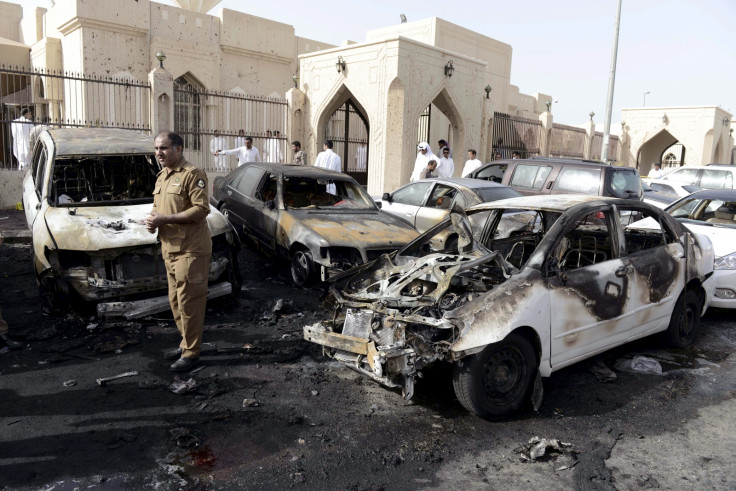Saudi Arabia: Will cross-dressing Isis terrorists and lingerie shops help ease restrictions on Saudi women?

Last week, a 19-year-old Saudi attempted to detonate explosives at a Shia mosque in Dammam, claiming allegiance to the Islamic State (Isis).
Saudi Arabia has long been exposed to the scourge of terrorism and it is with a heavy heart that I watch as it witnesses the harbinger of an even more frightening scourge: sectarianism.
It was quickly noted that the suicide bomber in this recent attack was disguised as a woman. Donning a niqab (face veil) and abaya (the requisite long black garment for women), he attempted to enter the women's section of the mosque at the south entrance before being stopped and chased away.
Stories like this are rife in Saudi Arabia, where anecdotes abound of burglars, criminals and smugglers "dressing in drag" to get away with their crime undetected. So long as being a woman renders one untouchable in Saudi society, this method of escape for criminals, terrorists and even, in some cases, activists will remain and thrive.
Given that, is it too far-fetched to explore what effect, if any, this terrible event will have on the mandatory dress-code for women in Saudi Arabia?
On a recent visit to our neighbourhood Dr. Café, my sister and I were upbraided by a member of the much-reviled Commission for the Promotion of Virtue and Prevention of Vice because we were not covering our faces.
Saudi Arabia has seen change come as a result of security concerns in the past. My older female friends and relatives remember a time when their passports did not include a picture, until international regulations surrounding airport security necessitated it.
As recently as the early 2000s, Saudi women did not have their own ID cards but were listed as legal minors on 'family notebook' cards held by their husbands or fathers.
That situation left women effectively traceless in the national security system, a worrying state of affairs if a female Saudi was to commit a crime, for example.
Equally, for decades there was no way for bank tellers to prove that a client was who she claimed to be, besides a flimsy copy of a family notebook held by her male guardian. Not only did this create issues for the woman involved, it raised worrying questions about transparency.
By 2013, with counter-terrorism high on Saudi Arabia's agenda, Riyadh made national identity cards mandatory for all citizens over the age of 15, whether male or female.
It was not just security concerns that led to this change in policy, but economics. As women began pouring into the labour market as teachers and doctors in recent years, they needed access to financial services.
Then in 2013 the late King Abdullah banned men from working in lingerie shops, leaving the jobs open only to women.
As recruiting from overseas was not just difficult but expensive, Saudi women were the only cost-effective choice to fill these vacancies. Not only that, but they were good for business - shops saw earnings quadruple thanks to female employees.

This has since trickled into other areas of retail, starting with cosmetics, then pharmacies and, most recently, supermarkets.
All this is key to the plight of women in Saudi Arabia: that whether in terms of security or economics, it is the need that will lead to change.
Of course, progress will be slow. Not because change so often takes time in Saudi society, but also because a great deal of mainstream political thought does not support it.
A recent video that went viral on Saudi social media showed a male supervisor scolding and then throwing a female student off a bus for unveiling her face.
On a recent visit to our neighbourhood Dr. Café (Saudi Arabia's answer to Starbucks), my sister and I – or rather our male driver – were upbraided by a member of the much-reviled Commission for the Promotion of Virtue and Prevention of Vice because we were not covering our faces. He warned us, via our driver, that he had taken down our details and if he caught us again we could face a criminal record.
This is the day-to-day reality of Saudi women. Perhaps now, and in light of the security threats it poses, authorities will think twice before continuing to implement and enforce such conservative and restrictive regulations on women.
And even if not, these recent cases demonstrate that when gains are made, it will not be thanks to frustrated activists or campaigns abroad; it will, once again, merely be a realistic change in pursuit of survival.
Linking security with face-veiling might be misconstrued as an argument in defense of the niqab ban in France - something that I am firmly against. Nor am I condoning humiliating regulations on women who do, in fact, choose to cover their faces. I respect and salute their choice.
But perhaps following the bloody events caused by a man all too happy to take advantage of a society so obsessed with women's faces so as to deem them criminal, we could finally have a society in which women will no longer worry about gaining a criminal record while running errands or returning home from school.
© Copyright IBTimes 2025. All rights reserved.





















